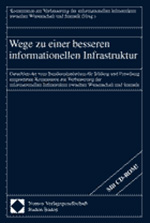Towards a Better Informational Infrastructure

The expert study published by the Comission for the Improvement of the Informational Infrastructure between Research and Statistics (in German only)
Nomos Verlagsgesellschaft, Baden-Baden 2001
Publication details
Excerpts from the statement by Prof. Dr. Hans Jürgen Krupp during a conversation with the press entitled: “New Forms of Cooperation between Research and Statistics” on September 21, 2001, in Berlin.
The Minister for Education and Research, Mrs. Buhlmann, convened a commission for the improvement of the German informational infrastructure. The central concern of the commission, which included data producers as well as data users, was the relationship between research and statistics. Mr. Hahlen, President of the Federal Statistical Office, was appointed vice-chair of the commission.
The commission’s first meeting took place on October 26, 1999, and its report was completed on March 13, 2001. By completing the report within such a short period of time, the commission made it possible for part of their recommendations to be put into practice during the current legislative period.
Their approximately 300-page report includes 85 pages of very comprehensive evaluation, describing the data situation in ten research fields—predominantly in the social and economic sciences—while examining the current problems and possibilities of longitudinal studies. The field of health and social services was discussed in detail as an example of the overall data situation.
The evaluation also examined the producers and providers of statistical data. The commission thus gave a comprehensive picture of the landscape of data provision in Germany, including not only the official statistical agencies but private data providers as well.
Their report was based on a large number of commissioned expert reports. These expert reports and exposés are included with the report on an 80 MB CD-ROM, thus offering the user detailed information on specific subjects.
The commission’s evaluation concludes that there is not a general lack of information; the problem is rather a lack of transparency. It is to be hoped that the KVI evaluation and especially the CD-ROM containing the export reports will give researchers a better overview of the existing data. Still, there are gaps that remain to be closed. Since the KVI did not perceive their role as that of a statistical advisory commission, in most cases they did not offer solutions to information gaps but simply pointed them out. However, in a few urgent cases, the commission did include recommendations for how to close these gaps.
The KVI report not only describes the current situation in Germany, but also offers 50 pages of information about other modern countries. This broad international overview is particularly useful in offering a range of solutions to problems such as those of data access. These solutions were used by the commission in turn as inspiration for the recommendations they included in their report.
The commission put forward 35 specific recommendations as to how the cooperation between research and statistics can be improved based on the traditional model of a division of labor.
The commission’s considerations focus on questions of data access, as well as related funding issues. They argue that the scant public funds could be put to more effective use by taking into consideration the abilities and problems of the sciences and the interests of data producers. Furthermore, they praise the pilot projects implemented by the Federal Ministry of Education and Research involving flat rates for data access charged by the data producers, and recommend that such projects be models for future developments.
The Federal Ministry of Education and Research has already offered financial support for these activities. Particularly in the starting phase, such funding may very well be used for project financing.
In the long run, these recommendations must be put into practice in the relevant institutions. The required infrastructure must be established and installed permanently. For this purpose, the commission offers concrete advice aimed at the institutionalization of a modern informational infrastructure. Still they do not provide readymade solutions to the issues discussed, which they considered outside of their scope of duties. They call for experts in data production, as well as experts in data use, to be fundamentally involved in creating a modern data infrastructure. This task is to be carried out by the German Council for Social and Economic Data. The Council is not intended to replace or compete with already established advisory bodies, but rather to mediate between data producers and data users while furthering dialogue within the two groups. The Ministry for Education and Research has already appointed representatives to the council, whose chairman is Prof. Karl Ulrich Mayer.